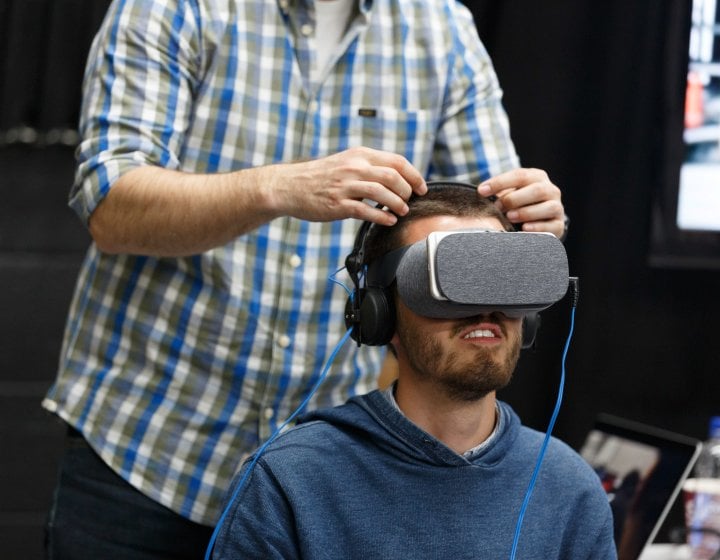Follow our step by step guide below
Whether you'd like to join us through an MPhil or PhD research degree, the process is simple and outlined in the step by step guide below. In both cases we welcome project proposals that indicate a clear and strong alignment with Falmouth's strategic research priorities, be it in response to a specific doctoral project brief or as an original idea of your own.
To give you the best chance in your application, whether MPhil or PhD, we've split the process into the following key stages, with a full breakdown of details in the subsections below.
01. Pre-application preparation
Read through this guidance, prepare your idea and ensure centre alignment:
a. Check entry requirements
b. Choose application route
c. Consider an optional expression of interest to connect informally with a potential supervisor for feedback
d. Start thinking about funding
02. Formal application submission
f. Prepare and submit your formal application, in line with guidance below.
a. Check entry requirements
Key dates for September 2026 entry
| Optional expression of Interest deadline | Application deadline | Interview period |
|---|---|---|
| 12 November 2025 | 30 January 2026 | Week commencing 20 April 2026 |
The normal minimum entry requirement for a place on the Research Degree at Falmouth University is an upper second class honours (2:1) degree of a British university or recognised institution of higher education, or an equivalent qualification from an institution outside of the UK.
However, a master's degree in an appropriate subject is considered to be a particularly valuable preparation for the academic and intellectual demands of an MPhil or PhD. In some instances, applicants without the minimum academic requirement as outlined above may be considered for a place on the Research Degree if they can demonstrate appropriate alternative qualifications, relevant professional experience, or previous research.
If English is not your first language, you will normally need to demonstrate that you are suitably proficient in English before we can enrol you on the Research Degree. You can do this by providing evidence of one of the following:
- A recent Falmouth-approved English Language Test (ELT) score which meets the University's requirements for the Research Degree: either an IELTS minimum overall test result score of 7.0 with a 7.0 in writing and with no other component score lower than 6.0, or an equivalent test score.
- Recent completion of an MA level course of study (Distinction only) in a majority English-speaking country.
By 'recent' we mean that your English Language Test score or MA level qualification needs to have been awarded no more than two years prior to the date that you would first enrol in the Research Degree at Falmouth. We cannot normally accept evidence that is older than this.
You may submit an application for a place on the Research Degree before you have obtained your IELTS or equivalent test score, or before you have received your MA certificate, but if you are offered a place then you would need to provide evidence of having satisfied this condition before we can enrol you.
Each applicant is assessed on an individual basis and if you are offered a place on the Research Degree, then depending on your level of English language proficiency as demonstrated through your application form and interview, we will inform you whether we would require a new IELTS result before you can begin your PhD studies.
Please be aware that we can no longer accept TOEFL test results for this purpose.
Requirements for distance learning overseas online applicants
In addition to meeting the standard academic and language eligibility requirements, applicants to the distance learning overseas online mode need to demonstrate that they:
- Can successfully conduct their research with the resources available to them at their distance learning place of study
- Have access to appropriate IT facilities, so that they can engage in supervision and training from their distance learning place of study
- Have the necessary time, commitment and appropriate attitude toward distance learning online study
Students on this mode do not hold a Student Visa so cannot enter the UK for the purpose of study or access Falmouth University's physical resources or buildings. Distance learning students have access to online resources available to all PGR students.
b. Select route to application
There are two routes for MPhil or PhD application.
Applicants can either apply by:
a. Submitting a project idea of their own; or
b. Responding directly to a Falmouth Doctoral Project brief.
Whilst we've created our Doctoral Project briefs to emphasise our priority areas of research interest, reflecting our Research & Knowledge Exchange strategic aims, we welcome and encourage the submission of any original research project ideas that align with our strategic objectives and fields of research expertise.
Check out our doctoral project briefs to find a project that you'd be passionate to explore, our browse through our Research & Knowledge Exchange pages to identify which best aligns with your original idea, in preparation for the submission of your Expression of Interest form.
Explore our Doctoral Project briefs
c. Confirm strategic alignment
If you're responding to a Doctoral Project Brief, please make it explicit within your application which brief you are responding to. If you're proposing your own research project, you'll need to explore our Research & Knowledge Exchange centres to identify the centre which most strongly aligns with your proposal idea. You'll need to familiarise yourself with the centre's purpose and objectives so that you can demonstrate a clear alignment with your expression of interest and formal application.
About Research & Knowledge Exchange
Research & Knowledge Exchange at Falmouth is reflected, explored and focused by our strategy. All of our projects, including postgraduate research theses, must align with our strategic aims so that, together, we may build knowledge, add value and drive impact through open innovation and real world solutions, in line with our research aims. More information about our overarching strategy can be found in our 2030 Strategy.
Explore our Research & Knowledge Exchange centres

Centre for Blended Realities
Utilising shared technologies, the Centre for Blended Realities fosters excellence in collaborative ...

Centre for Arts & Health
Through collaborative, arts based participatory research, the Centre for Arts & Health at Falmou...

Centre for Heritage, Culture & Society
The Centre for Heritage, Culture & Society addresses people’s relationships with past, present...

Centre for Pedagogy Futures
The Centre for Pedagogy Futures is a space to explore, imagine, challenge and critique pedagogy for ...
d. Submit an Expression of Interest
Optionally, Submit an Expression of Interest.
What's an Expression of Interest?
Falmouth's expression of interest stage is an optional pre-application process which gives candidates interested in pursuing a research degree with us an opportunity to introduce their research proposal and receive preliminary feedback. This optional stage enhances accessibility to the PhD programme by allowing access to academic support in advance of formal application.
Download the form from the link below and send your completed expression of interest form to PGR@falmouth.ac.uk
Once received, the completed expression of interest form is reviewed by subject specialist academics, where it is assessed for appropriate alignment to the research strategy, potential supervision availability, potential resource needs and funding requirements.
Feedback on the expression of interest is then communicated to the candidate via email or Teams video call with an appropriate academic member of staff, who could be a potential Director of Studies or Co-Supervisor. Feedback will be provided between the submission deadline published in point a. above and 15 December 2025.
Submission Deadline
Each year there's an expression of interest deadline for applicants. This deadline is given as one of the key dates above in section a. Check entry requirements. We are unable to give feedback on expressions of interest after the published deadline.
e. Search for funding
Fund your research degree
We offer a range of options to help you fund your PhD or MPhil, including discounted fees for Falmouth University alumni and an international and EU fee reduction scheme. Visit our Fund your research degree page to find information about different funding option.
Doctoral Loans
Applicants may also be eligible for a Doctoral Loan, details of which can be found on our Doctoral Loans information page.
f. Submit formal application
Please ensure you read the Research Degree Proposal and Application Guidance Notes 2026-27 carefully when preparing your online application.
Formal applications are submitted via our online application form. Links to the online application forms are listed below by course mode of study.
Apply for MPhil/PhD Research Full-time on-campus
Apply for MPhil/PhD Research Part-time on-campus
Apply for MPhil/PhD Research Part-time Online
If you'd like to join our Research Degree Opportunities mailing list for 2027 please contact pgr@falmouth.ac.uk.
For applicants responding to one of the two AD[A]PT briefs, A Room or One's Own or Pathways to Net Zero, please send your application paperwork (which can be found on the AD[A]PT website) to pgr@falmouth.ac.uk by the deadline 5 March 2026.

